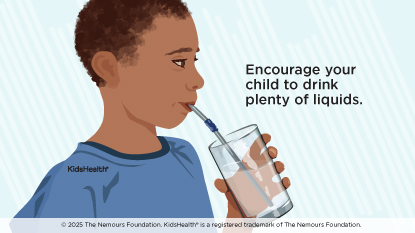Health care providers use sedation (medicine to make kids feel sleepy and not feel pain during a procedure or surgery). Some kids wake up from sedation feeling sick to their stomach and may vomit. Vomiting can last for a few hours until the medicine wears off.
Your child vomited while they were waking up from sedation. They are now vomiting less or not at all, and able to drink liquids. Here's how to care for them at home.

- Give any medicines your health care provider prescribes.
- Let your child rest as needed.
For babies:
- Babies can continue to breastfeed or bottle-feed as usual. If they eat solids, you can continue to give them their regular diet, but start with smaller meals first.
- Do NOT give babies:
- Plain water, sports drinks, soda, or full-strength (undiluted) juice
- Diluted (watered-down) formula
For older kids and teens:
- Offer plenty of liquids. They can drink an oral electrolyte solution (such as Pedialyte®, Enfalyte®, or a store brand), frozen electrolyte pops (such as Pedialyte® or a store brand), shaved ice, and flavored gelatin. If your health care provider says it's OK, they can also drink water or water with a splash of clear fruit juice (like apple or white grape juice).
- Do NOT give:
- Sports drinks or full-strength (undiluted) fruit juices, which have a lot of sugar.
- Medicines for nausea or vomiting unless your health care provider prescribes them.
- Give your child small, frequent meals. Try bland foods like crackers, pasta, and soups at first. Then slowly help your child go back to their regular diet.

What causes vomiting after sedation? It may be caused by:
- Side effects from the sedation medicine
- Slowing of the digestive tract during the procedure or surgery
- Hunger from not being able to eat before the procedure or surgery




